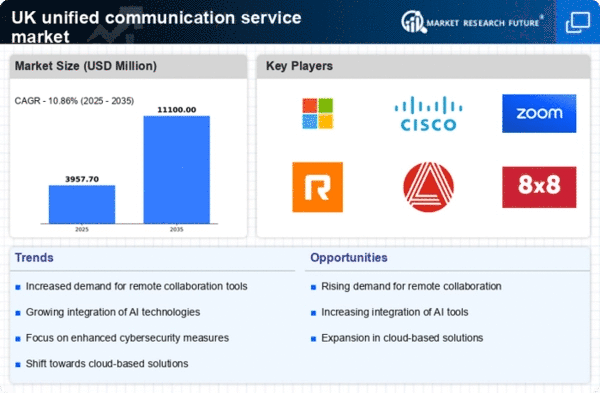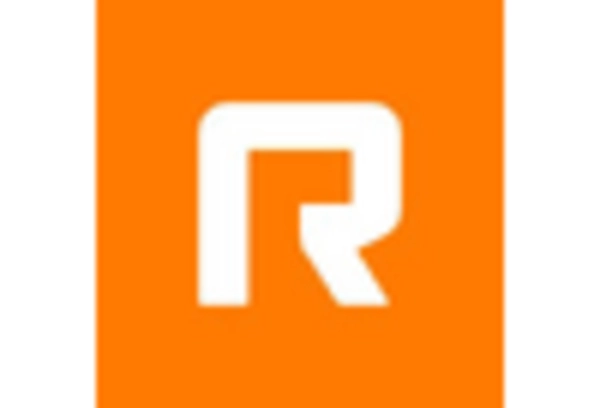Increased Focus on Employee Engagement
In the context of the unified communication-service market, there is a rising emphasis on employee engagement strategies. Companies in the UK are recognizing that effective communication tools are essential for fostering a motivated workforce. Research indicates that organizations with high employee engagement levels can achieve up to 21% higher profitability. As a result, businesses are increasingly investing in unified communication solutions that promote collaboration and feedback. This trend suggests that the unified communication-service market will continue to expand, as firms prioritize tools that enhance employee interaction and satisfaction, ultimately leading to improved organizational performance.
Growing Demand for Remote Collaboration Tools
The unified communication-service market is experiencing a notable surge in demand for remote collaboration tools. As businesses in the UK increasingly adopt flexible working arrangements, the need for effective communication solutions has become paramount. According to recent data, approximately 70% of UK companies have implemented remote work policies, driving the necessity for platforms that facilitate seamless interaction among teams. This trend is likely to continue, as organizations seek to enhance productivity and maintain connectivity among employees, regardless of their physical location. The unified communication-service market is thus positioned to benefit from this growing demand, as companies invest in technologies that support virtual meetings, instant messaging, and collaborative workspaces.
Regulatory Compliance and Data Protection Needs
In the unified communication-service market, the regulatory landscape surrounding data protection and compliance is becoming increasingly stringent. UK businesses are required to adhere to various regulations, such as the General Data Protection Regulation (GDPR), which mandates strict guidelines for data handling and privacy. This regulatory environment is driving organizations to invest in communication solutions that ensure compliance and protect sensitive information. As a result, the unified communication-service market is likely to see a rise in demand for secure communication platforms that offer robust data protection features. Companies are prioritizing solutions that not only facilitate communication but also safeguard their data against potential breaches.
Advancements in Mobile Communication Technologies
The unified communication-service market is significantly influenced by advancements in mobile communication technologies. With the proliferation of smartphones and tablets, UK businesses are increasingly adopting mobile-friendly communication solutions. Data shows that over 60% of UK employees utilize mobile devices for work-related communication, highlighting the necessity for unified platforms that integrate various communication channels. This trend indicates a shift towards more flexible and accessible communication methods, which are essential for maintaining productivity in a fast-paced business environment. Consequently, the unified communication-service market is likely to see continued growth as companies seek to leverage mobile technologies to enhance their communication strategies.
Rising Importance of Data Analytics in Communication
The unified communication-service market is witnessing a growing importance placed on data analytics in communication strategies. Businesses in the UK are increasingly utilizing analytics to assess communication effectiveness and employee engagement. Approximately 55% of UK organizations report using data analytics to inform their communication decisions. This trend suggests that companies are recognizing the value of data-driven insights in optimizing their communication processes. As a result, the unified communication-service market is expected to evolve, with providers offering solutions that incorporate advanced analytics capabilities, enabling organizations to make informed decisions and improve overall communication efficiency.
















